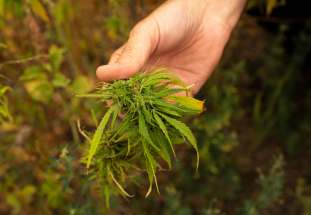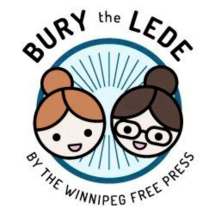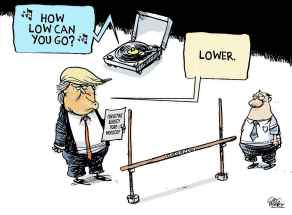Plenty of weed, just for feed Manitoba's burgeoning, well-established hemp industry is trying to be heard over the din of marijuana's looming legalization to educate consumers about the non-intoxicating seed's health benefits
Read this article for free:
or
Already have an account? Log in here »
To continue reading, please subscribe:
Monthly Digital Subscription
$0 for the first 4 weeks*
- Enjoy unlimited reading on winnipegfreepress.com
- Read the E-Edition, our digital replica newspaper
- Access News Break, our award-winning app
- Play interactive puzzles
*No charge for 4 weeks then price increases to the regular rate of $19.00 plus GST every four weeks. Offer available to new and qualified returning subscribers only. Cancel any time.
Monthly Digital Subscription
$4.75/week*
- Enjoy unlimited reading on winnipegfreepress.com
- Read the E-Edition, our digital replica newspaper
- Access News Break, our award-winning app
- Play interactive puzzles
*Billed as $19 plus GST every four weeks. Cancel any time.
To continue reading, please subscribe:
Add Free Press access to your Brandon Sun subscription for only an additional
$1 for the first 4 weeks*
*Your next subscription payment will increase by $1.00 and you will be charged $16.99 plus GST for four weeks. After four weeks, your payment will increase to $23.99 plus GST every four weeks.
Read unlimited articles for free today:
or
Already have an account? Log in here »
Hey there, time traveller!
This article was published 05/10/2018 (2625 days ago), so information in it may no longer be current.
Clarence Shwaluk stood at the edge of a sprawling farm field in southeast Manitoba, surveying the crop. Local farmers, he said, had been talking about it.
“This crop is definitely unique. It looks completely different from other crops that are grown here, the corn or the wheat that’s grown, or soybeans,” he said.
“So it does get a lot of attention…. They’re looking at it and they’re going, ‘Well, that looks like marijuana.’”
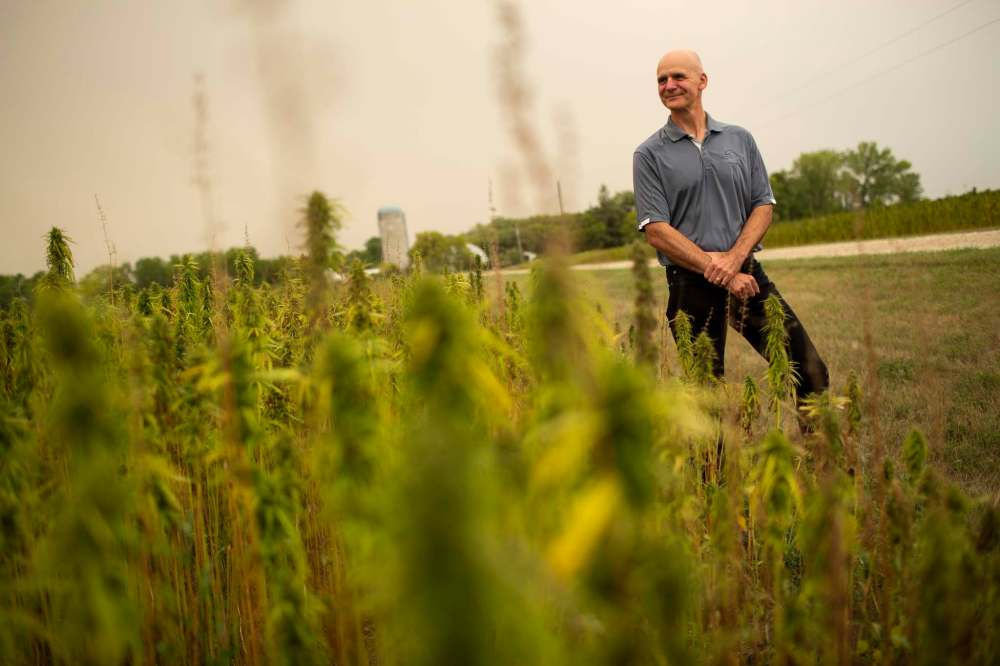
In a sense, it is marijuana. Then again, it’s definitely not.
It was a few weeks back, a hazy August day near Kleefeld, and the roughly 160 acres of cannabis in this field were almost ready for harvest. If this cannabis were meant for recreational or medical drug use, the harvest would gather the female plants’ pungent buds.
But this is hemp, and the buds are just a byproduct; Shwaluk’s employer wants the seeds.
Shwaluk is the director of farm operations for the parent company of hemp food retailer Manitoba Harvest, and he’s visiting a farm owned by one of the company’s suppliers — one of the first hemp farms in this corner of the province, he said.
At the end of their journey, the hemp seeds from this prairie field will end up in someone’s meal. But in order to get those seeds on a customer’s plate, Manitoba Harvest needs the public to understand the difference between hemp and marijuana, which are both specially-bred varieties of the same plant, Cannabis sativa.
“With the changes in the legislation there’s obviously a lot of focus now on… recreational or medical cannabis,” Shwaluk said.
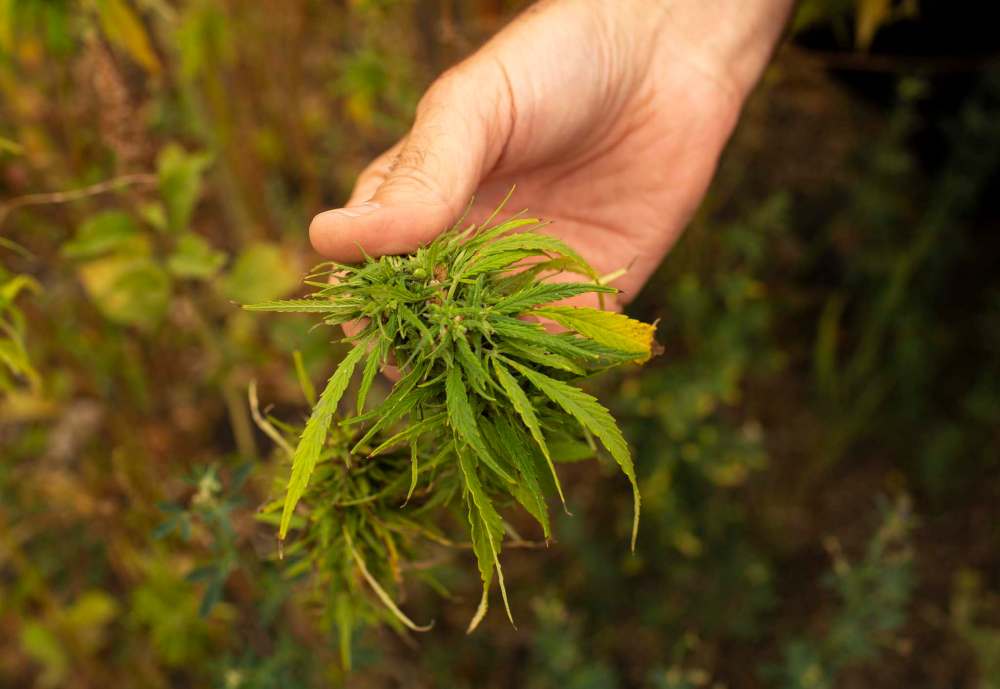
“We do need to have our consumers understand that this is neither of those, it’s low-THC, and what we do with the crop is provide a healthy, nutritious food product.”
THC is the chemical compound responsible for marijuana’s euphoric effects, but hemp has almost none of it. The federal government, which regulates all commercial hemp production in Canada, requires all hemp crops to contain less than 0.3 per cent THC in the leaves and buds.
But it can be hard to tell the difference between hemp and marijuana by just glancing at the plants, or even by smelling them. The unmistakable, pungent scent of cannabis lingers at the field’s edge.
“I’ve heard stories from growers where they see a footpath and a bare spot in the middle of the field,” Shwaluk said with a laugh.
“But you’re not going to have any impact if you try to smoke it. You may get a headache, but that’s about it.”

This year, Manitoba Harvest is working with about 60 Canadian hemp growers as far east as Quebec. (Saskatchewan cultivates the most acres of government-registered industrial hemp among all the provinces, according to the most recent Health Canada statistics. Alberta is second, followed by Manitoba, with Quebec in a distant fourth place.)
The hemp seeds harvested by Manitoba Harvest’s suppliers — called “grain” in industry parlance — get shipped to the company’s primary production facility and head office in Ste. Agathe. Decorative hemp plants sprout from planters out front, and the boardroom is dominated by a massive conference table featuring a layer of hemp seeds under glass.
Manitoba Harvest was bought by U.S. firm Compass Diversified Holdings in June 2015, then merged with bulk hemp food supplier Hemp Oil Canada later that year. The combined company, called Fresh Hemp Foods Ltd., is easily the world’s biggest hemp food company, chief operating officer Barry Tomiski said. It processes more than 30 million pounds of hemp annually.
“If you go back half a dozen years ago there was probably three or four competitors,” he said. “Now there’s probably a dozen…. We’ve seen a lot of new entrants into the business over the last five years.”
After being cleaned by third-party seed cleaners and undergoing grading at the Ste. Agathe facility, seeds destined for Manitoba Harvest’s retail products get shipped to the company’s secondary processing and packaging plant in a northwest Winnipeg industrial park. The Free Press is allowed inside for a tour, but photography is not permitted, in order to protect the company’s intellectual property.
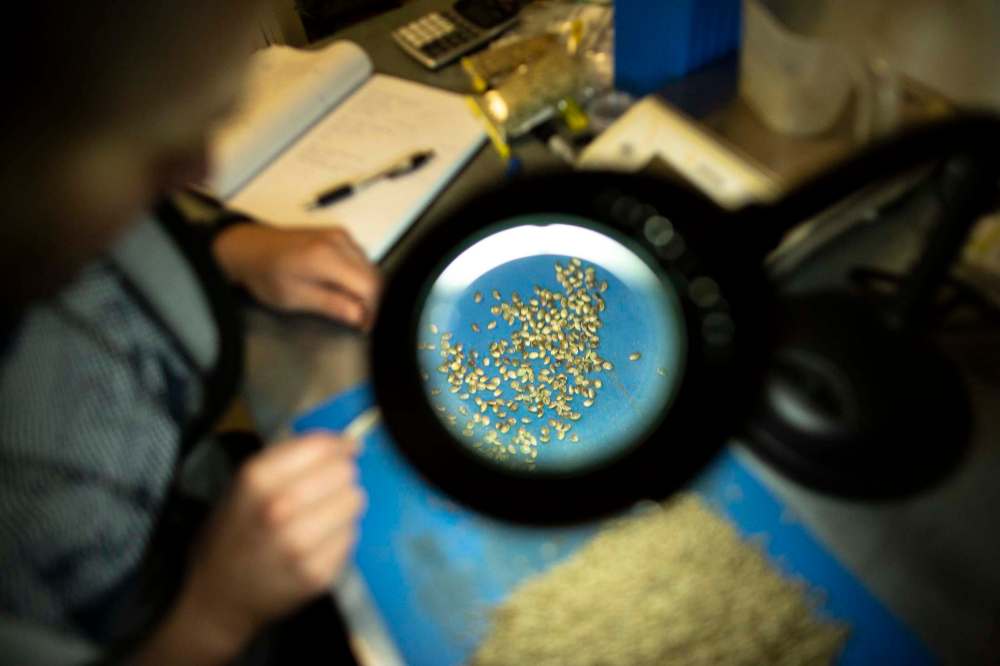
“We’re pioneers in the industry, here, which is why everything inside the plant is proprietary,” plant manager Kevin Kaluzny explained as he walked among giant outdoor hoppers that can each hold more than 40,000 kilograms of hemp seed. The pre-recorded cries of predatory birds echoed across the courtyard, warding off scavenging animals in search of a hemp meal.
Inside the cavernous processing plant itself, the warm, nutty scent of hemp seeds was overwhelming. An endless stream of seeds hummed through enormous machines that cracked and separated the hulls and removed any foreign materials. All that was left were the seeds’ cores, which ended up in 900-kilogram bags to await final tests for unwanted microbes and gluten.
Some of those seed cores — branded by Manitoba Harvest as Hemp Hearts — end up processed into hemp seed oil or hemp protein powder, but most would be packed into pouches and shipped off to stores.
Getting consumers to pick hemp foods off a grocery store shelf requires some guidance, said Sarah Malloy, an integrated marketing specialist with Manitoba Harvest.
“Education’s our No. 1 marketing tactic,” she said. “People don’t know what hemp is, and if they do know what it is they don’t know how to use it. And some people don’t even know that it’s a food.”

The company did about 1,800 demos in more than 500 Costco stores in August, Tomiski said.
“And what they’re doing is, they’re saying, ‘here, try this on your yogurt,’ ‘here, try this on your toast with avocado,’” he said.
“Once people get that initial first taste, and they’ve never had it before, they go, ‘Wow. This is kind of good, it’s kind of nutty, it’s a little bit like a sunflower seed, but it’s different.’”
Tomiski has yet to hear “anyone say they that dislike the taste of hulled hemp seed.”
“But I think what they like about it is the versatility and how they can use it, and the fact that they’re getting a boost of (omegas and amino acids),” he said.
The healthfulness of hemp seeds is a key marketing message, Malloy said; words such as “protein” and “omegas” are given prominence on Manitoba Harvest’s retail packages. The company’s target demographic is men and women between the ages of 25 and 45.

“They’re people that are interested in health and wellness and trying new foods, (and are) more adventurous when it comes to what they make,” she said. “And a lot of moms that are health-conscious when it comes to what they’re feeding their kids.”
Still, those consumers have to be taught how to use hemp seeds in their cooking.
“We try and share some recipes on social media and show that it’s really an easy thing to add to any meal,” she said. “Just sprinkle it on anything — salad, cereal, yogurt.”
But some future Manitoba Harvest products will be more like ready-to-eat, packaged snack goods. A new line of hemp granola products will launch in 2019 with three flavours.
“We wanted a breakfast option, a snack option that was high-protein, low sugar,” Malloy said.
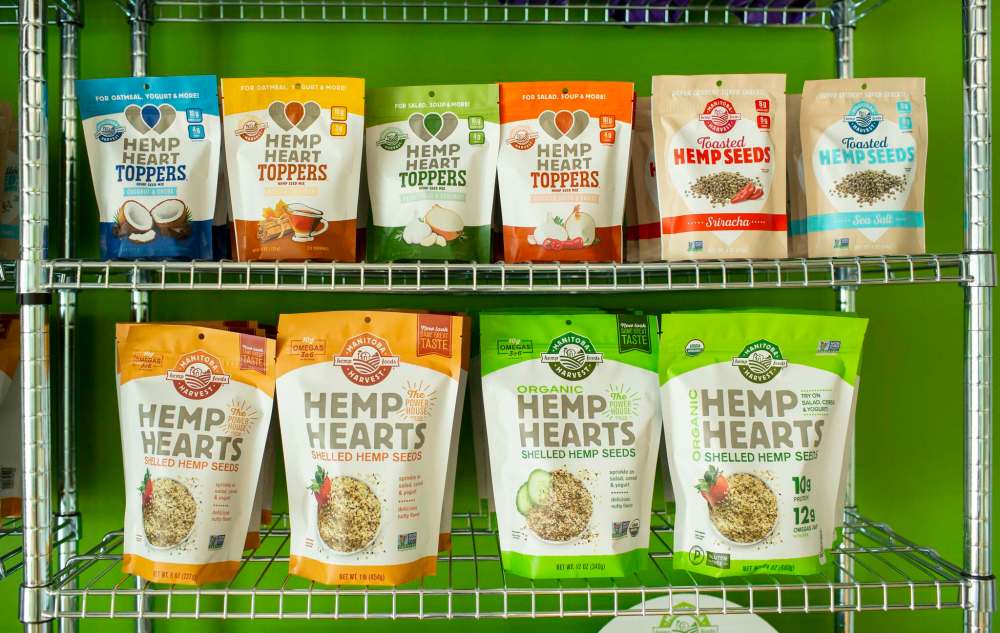
“And granola is something that a lot of people use hemp in already, either they’re adding it to pre-made store-bought granola or they’re adding it to their homemade granola. So it seemed like a natural fit.”
Even with recreational cannabis legalization focusing public attention on the cannabis plant, Tomiski said Manitoba Harvest works hard to differentiate the company’s product from drug-type marijuana. For him, even the word “cannabis” is one to avoid.
“It has the connotation that it’s the other sister to hemp, which has the THC and the psychoactive component to it,” he said.
“And we’ve been diligent, over the past 20 years, (in) explaining those differences, and that hemp is a health food that does not contain the psychoactive component that people are looking for, perhaps, on the other spectrum.”
Could cannabis legalization make it easier to explain that difference to people?
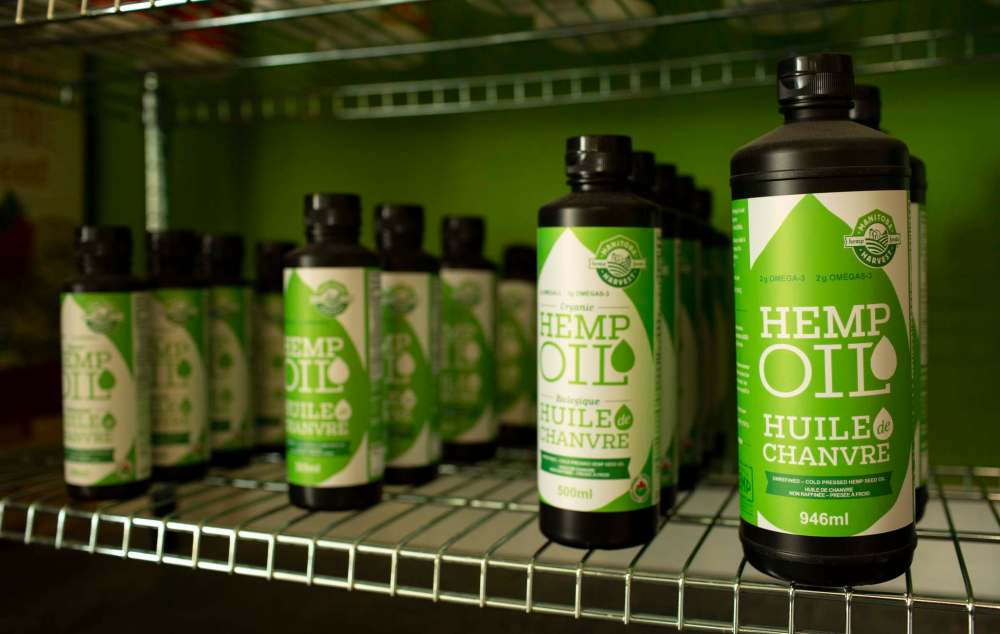
“Well, that remains to be seen,” he said.
solomon.israel@theleafnews.com






